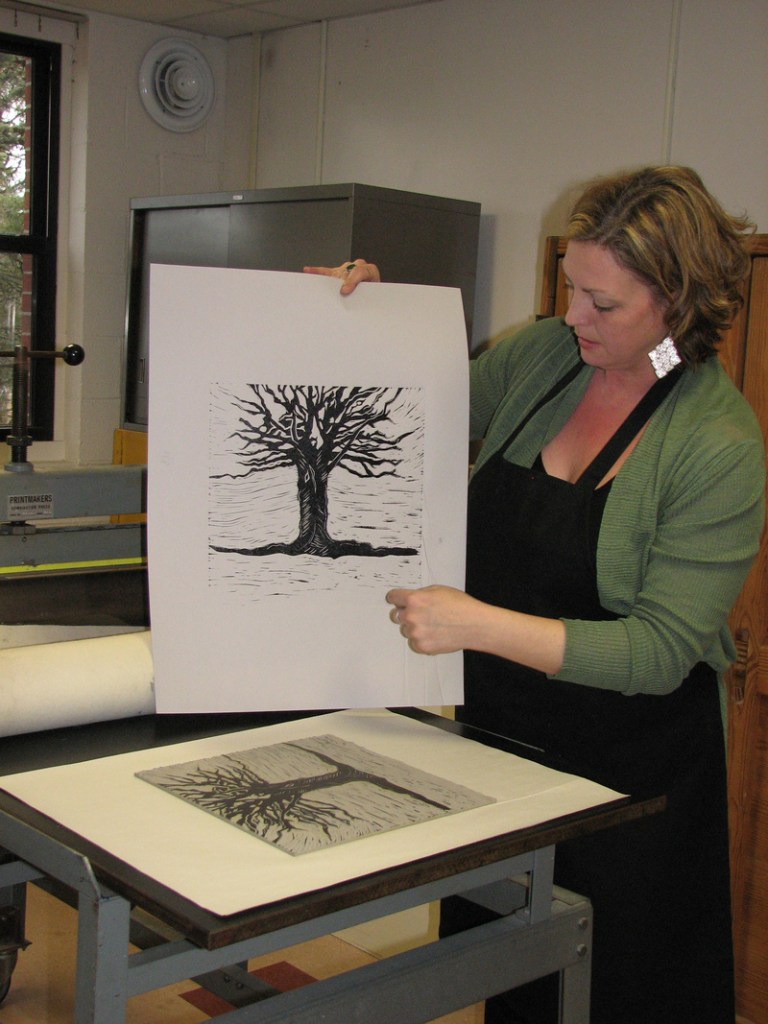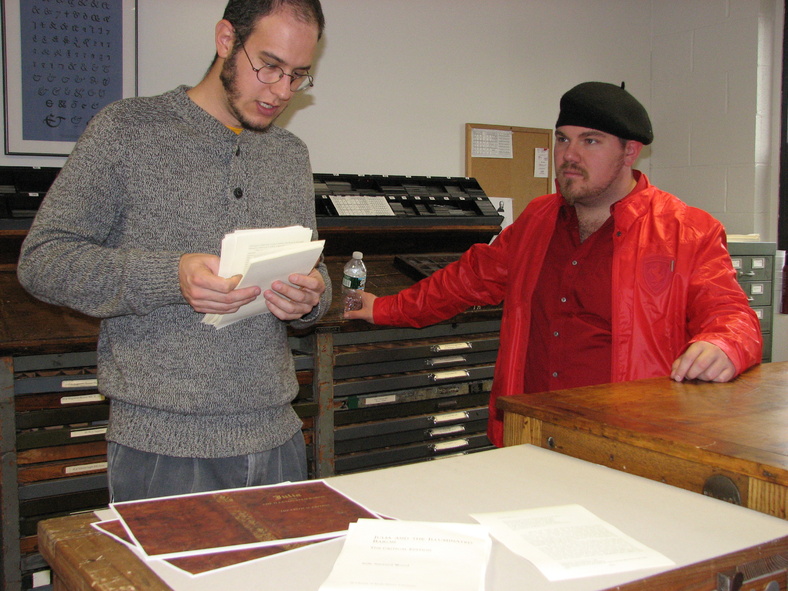MACHIAS — Students at the University of Maine at Machias feel like they are raising the dead.
“It’s like bringing an extinct animal back,” said Joshua W. Luman. “It’s like the ‘Jurassic Park’ of the book world. Except when we do this, it won’t be just the bones but a living, breathing thing.”
A senior in the book arts and English department, Luman is overseeing a project to reprint the first novel published in Maine and one of the first gothic novels published in America: “Julia and the Illuminated Baron,” written by Sally Sayward Wood of York and published in 1800 by Oracle Press in Portsmouth, N.H.
The book has been out of print in the United States for 212 years, but will have the rare chance to find a new audience this spring. That’s when the Library of Early Maine Literature, a scholarly imprint of the University of Maine at Machias Press, will publish an edited and updated version of the historic book. Students at this tiny and remote university on Maine’s Bold Coast have been working on the project for parts of two years.
It began when Gerard NeCastro, an English professor at UMaine Machias, rediscovered “Julia” and its significance in Maine’s literary history and brought it to the attention of his English department colleague, Marcus LiBrizzi.
LiBrizzi was instantly intrigued, not merely with prospects of bringing back a “long, lost treasure of Maine’s literary history,” but also for the challenge it would present to students in his English class.
Wood is regarded as Maine’s first novelist, and her debut was the first novel by a Maine writer — though Maine was still part of Massachusetts in 1800. “But more remarkable, on the national scene, this was the first gothic novel ever published by a woman in the United States,” LiBrizzi said.
Unfortunately, the New Hampshire publisher did not do the author any favors. The 1800 edition of the book was riddled with mistakes, and by today’s standards would be considered illegible. Some pages appeared as walls of words without paragraph breaks and full of random punctuation.
As a final insult, Wood’s name was left off the title page. Keeping with the convention of the day, the book’s authorship was attributed to “A Lady of Massachusetts.”
LiBrizzi tasked his English students with cleaning up the copy. Last year, they waded through the text, correcting mistakes and updating the spelling to make it more readable for contemporary audiences.
Students in Bernie Vinzani’s book arts program are experimenting with typeface, making decisions about page ornamentation, cover design and other visual elements. The goal is to honor the look and standards of book publishing in 1800, but with modern sophistication.
If the schedule holds, the 2012 edition of Wood’s book will be published in late May or early June, Vinzani said.
Given the mishandling of the book’s publication in 1800, LiBrizzi considers the UMaine at Machias publication the definitive version of “Julia and the Illuminated Baron” and the one that will be judged for posterity.
“There is an argument to be made that the edition we are putting out this year is the first edition that really showcases the work. It will be the first fully edited version with proper notations and illustrations,” said LiBrizzi, managing editor for the project.
The trick was honoring Wood’s elegant writing style and cadence while updating her words to make it fully accessible today’s audience, he said.
“Julia and the Illuminated Baron” is a gothic tale of intrigue and romance. Set in France during the time of the French revolution, it tells the story of a beautiful young woman of impeccable virtues. She falls in love with a baron who is a member of a secret society, the Illuminati. He subjects Julia to his obsessions and imprisonment.
By today’s standards of gothic writing, “Julia and the Illuminated Baron” is tame. Wood populated her story with castles, crypts, cemeteries and suspense, but it does not have the blood and gore that people expect in gothic novels today.
Wood was born in 1759 to a prominent York family, which was loyal to the British and likely subject to difficult times in the community. She began her writing career in 1783, soon after the death of her first husband.
Wood began writing as a way to fill the hours during her grief. Her life was never easy. Two husbands died, and she lost a son at sea. She wrote “Julia” several years before it was published, and died in York in 1854.
Despite problems associated with its first printing, the book was considered successful. It was published in England in 1804 and later translated into French. Wood wrote other novels as well, though “Julia” remained her best known.
Few copies exist today. Students at UMaine Machias used microfiche for their project.
The publication of the book shines a light on the books arts program at the university and the upstart UMaine Machias press, which began in 2006. A grant from the Stephen and Tabitha King Foundation, which publishes literature and artist’s books from the region, helped the program get started.
The Library of Early Maine Literature is an imprint of the press, specializing in rare and important literary works. Its sister, the Stone Island Press, publishes contemporary Maine poetry and fiction.
With fewer than 900 students, the university is the smallest campus in the University of Maine System, and it is best known as New England’s only public university with an environmental liberal arts core curriculum.
LiBrizzi thinks that Wood would be pleased with the efforts of the students here.
“My guess is that she’d be more than pleased,” he said. “In her lifetime, the only edition that she saw was so poorly put together, I think she suffered under the idea that it was so mangled by the printer, and there was nothing she could do about it.
“We’re trying to make it right.”
Staff Writer Bob Keyes can be contacted at 791-6457 or:
bkeyes@pressherald.com
Twitter: pphbkeyes
Send questions/comments to the editors.





Success. Please wait for the page to reload. If the page does not reload within 5 seconds, please refresh the page.
Enter your email and password to access comments.
Hi, to comment on stories you must . This profile is in addition to your subscription and website login.
Already have a commenting profile? .
Invalid username/password.
Please check your email to confirm and complete your registration.
Only subscribers are eligible to post comments. Please subscribe or login first for digital access. Here’s why.
Use the form below to reset your password. When you've submitted your account email, we will send an email with a reset code.